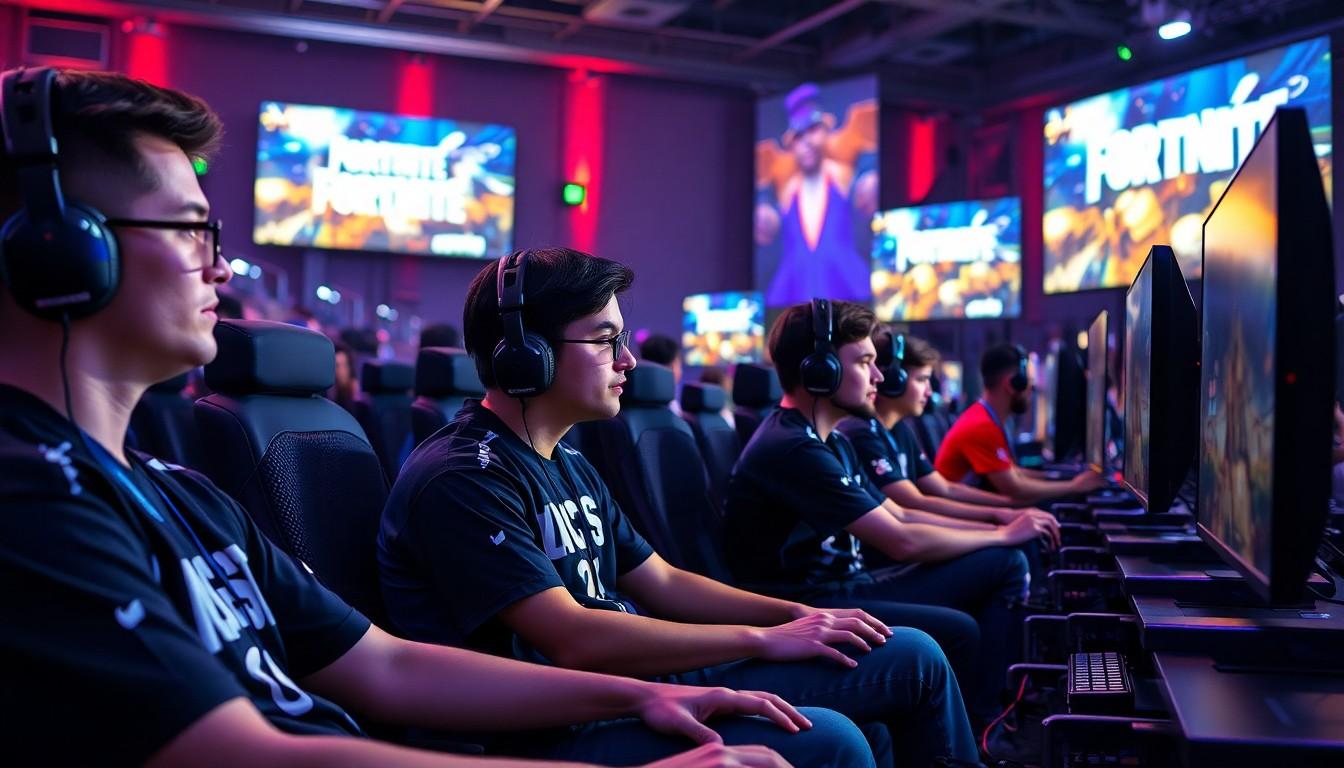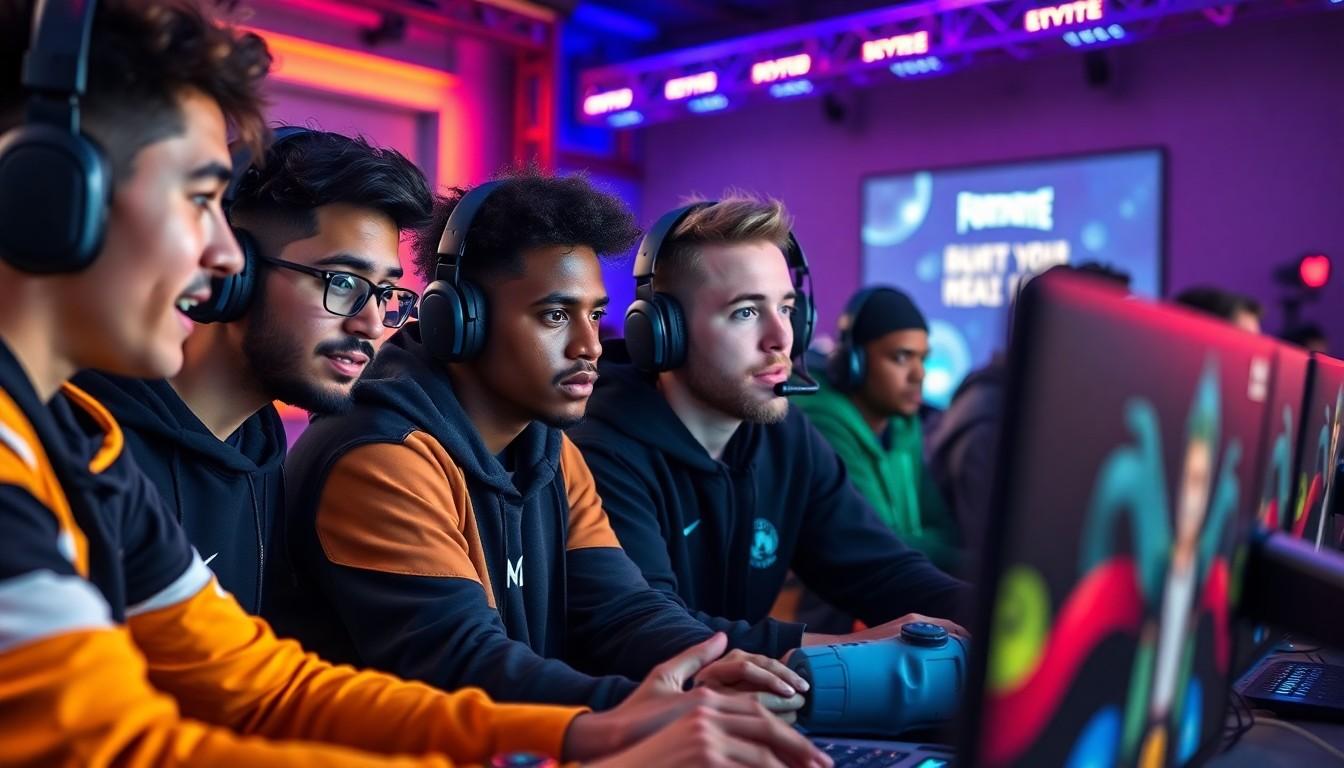
Esports Teams Fortnite: Discover the Titans Dominating the Competitive Arena
In the fast-paced world of esports, Fortnite reigns supreme, captivating millions with its vibrant landscapes and intense battles. With players building towers faster than they can say “Victory Royale,” it’s no wonder that esports teams are scrambling to recruit the best of the best. These teams aren’t just groups of gamers; they’re modern-day gladiators, battling it out in the arena for glory, fame, and a hefty slice of the prize pool pie.
Overview of Esports Teams in Fortnite
Esports teams in Fortnite represent a dynamic and competitive landscape. They consist of skilled players who excel in strategy, communication, and reflexes. Teams like FaZe Clan, Team Liquid, and TSM have gained recognition for their tactical gameplay and exceptional performances in major tournaments.
Fortnite esports scenes attract players from various backgrounds, each contributing unique skills. Competitive play involves intense matches, where teamwork plays a crucial role in securing victories. Players often practice extensively, refining their abilities to master building techniques and combat strategies.
Prize pools for Fortnite competitions reach millions of dollars, motivating teams and players to perform at their best. The Fortnite World Cup, for example, featured a prize pool of over $30 million in its inaugural event, highlighting the game’s significant financial opportunities.
Streaming platforms enhance the visibility of esports teams, allowing them to engage with fans while showcasing their skillset. Many teams foster rich communities through social media, creating a loyal following that supports their endeavors both in and out of competitions.
Esports teams also collaborate with brands and sponsors, helping to elevate their presence in the industry. These partnerships offer financial support, enabling teams to participate in more events and develop their roster. Rising teams often compete in various league structures as they aim for recognition within the Fortnite competitive scene.
Fortnite remains a staple in the esports community due to its constant updates and evolving gameplay. The competitive environment continues to grow, encouraging players and teams to innovate and excel.
Notable Fortnite Esports Teams

Fortnite boasts several prestigious esports teams, each delivering outstanding performances. These organizations highlight exceptional talent and strategic prowess.
Team Liquid
Team Liquid stands as a powerhouse in the Fortnite esports scene. Known for its strong roster, the team emphasizes skill and teamwork. Players like Zander and TSM’s former star, Poach, contribute to the team’s success with their tactical approaches. Team Liquid’s focus on preparation and communication underscores its effectiveness in high-stakes tournaments. Their achievements include multiple top finishes in significant competitions, showcasing their ability to adapt under pressure. Sponsorship deals allow Team Liquid to further invest in training and resources, maintaining its competitive edge.
FaZe Clan
FaZe Clan remains a standout name in esports, especially in Fortnite. With a roster filled with renowned players, FaZe emphasizes a mix of talent and entertainment. Notable members like Tfue and Bugha exemplify top-tier skill and dedication. Their dynamic gameplay captivates both fans and audiences during competitions. Frequent participation in high-profile tournaments ensures FaZe Clan remains in the spotlight, consistently securing impressive prize winnings. The organization’s strong brand presence also fosters collaborations with popular brands, enhancing its visibility in the gaming community.
TSM (Team SoloMid)
TSM, or Team SoloMid, has carved out a significant foothold in Fortnite esports. The team’s strategy hinges on superior game sense and effective communication. Players such as Myth and Booga have earned accolades for their performances in competitive matches. TSM’s rigorous practice regimes promote excellence and preparedness. Their history of achieving top ranks in tournaments reflects their commitment to the game. Partnerships with major sponsors further bolster TSM’s ability to attract talent and participate in various events, reinforcing its standing in the esports landscape.
Key Strategies of Successful Teams
Successful esports teams in Fortnite utilize a range of strategies that elevate their game. Team composition and gameplay tactics form the foundation of their competitive edge.
Team Composition
Diverse skill sets define effective team composition. Players often bring unique strengths, such as building, combat, and strategic planning. Each team member plays a critical role, ensuring a well-rounded approach to challenges. Effective communication enhances synergies among players. Coaches or analysts frequently support teams, offering insights and strategies. This collaborative environment fosters improvement, allowing teams to adapt to various in-game scenarios. For instance, a balanced team might feature a builder, a shooter, and a tactician, ensuring they can handle any situation that arises during matches.
Gameplay Tactics
Strategic gameplay tactics differentiate successful Fortnite teams from their competitors. Teams rely on rotation strategies that maximize map control and positioning. Coordinated pushes often catch opponents off guard, leading to advantageous fights. Building techniques, such as quick ramps and defensive structures, protect players during engagements. Frequent practice sessions help refine these tactics, ensuring teams react swiftly under pressure. Positioning during the storm phase adds another layer of strategy, as teams must anticipate movements. Effective resource management keeps teams stocked with essential materials, ultimately influencing match outcomes. Thus, successful tactics contribute significantly to a team’s overall performance in tournaments.
The Impact of Esports Teams on the Fortnite Community
Esports teams profoundly influence the Fortnite community by fostering competitive spirit and camaraderie. Passionate players engage with their favorite teams, drawing inspiration from their achievements and teamwork. Each team’s unique identity enhances fan engagement, creating dedicated followings that contribute to the overall popularity of Fortnite esports.
Successful teams, such as FaZe Clan and Team Liquid, inspire new players. These organizations showcase top-tier talent and highlight diverse skill sets, making them role models for aspiring gamers. The visibility of these teams promotes skill development among players, emphasizing the importance of strategies and teamwork in achieving success.
Community events organized by esports teams often entail tournaments and meet-and-greets. Such events provide opportunities for fans to interact with their favorite players, cultivating deeper connections and loyalty. Inclusivity characterizes many teams’ initiatives, as they strive to support diverse player backgrounds and broaden access to competitive gaming.
The financial success of esports teams attracts sponsors. These partnerships not only help teams grow but also elevate the entire Fortnite community. Financial backing allows teams to participate in more events, enhancing exposure and competitiveness within the esports landscape.
Teams often engage in charitable endeavors, positively impacting the community. Initiatives like fundraising streams or collaboration with nonprofit organizations demonstrate their commitment to social responsibility. Their efforts can inspire fans to give back, promoting a culture of generosity.
As Fortnite evolves through regular updates, esports teams adapt alongside the game. Continuous adaptation encourages players to innovate new strategies and techniques, maintaining an exciting and dynamic environment. Overall, the presence of esports teams enriches the Fortnite community, shaping its future and driving engagement among players and fans alike.
Future of Esports Teams in Fortnite
Esports teams in Fortnite are poised for continued growth and evolution. As the competitive landscape shifts, innovation will play a key role in shaping team dynamics and strategies. Potential advancements, like enhanced coaching techniques and improved communication tools, can significantly influence team performance.
Tournament structures are likely to expand, offering more opportunities for emerging talent. Financial support from sponsors is expected to rise, allowing teams to invest in better training facilities and resources. Stream platforms will continue to enhance visibility, fostering deeper connections between teams and their fan bases.
The rise of new talent cannot be overlooked. Young players are consistently showcasing their skills in various tournaments, challenging established teams to elevate their game. Diverse backgrounds among players bring fresh perspectives and strategies to the competitive scene.
Fortnite’s evolving meta will also impact team strategies. Incorporating new tactics and adapting to gameplay changes will become essential for sustained success. Strong focus on teamwork and collaboration will define the future prototypes of successful teams.
Community engagement remains critical. Teams actively participating in events will further strengthen fan loyalty and promote skill development. Charitable initiatives led by teams will contribute to a positive community culture.
Performance analytics will become more refined, allowing coaches to assess gameplay and improve strategies. Building on statistical insights can yield competitive advantages, reshaping how teams approach tournaments.
Ultimately, esports teams will continue to be vital in shaping the Fortnite ecosystem. Their presence not only drives competition but also fosters community spirit, promising a vibrant future for both players and fans alike.
Conclusion
The landscape of Fortnite esports teams is vibrant and ever-evolving. With a focus on teamwork and strategic gameplay, these teams not only compete for impressive prize pools but also cultivate a passionate community. Their influence extends beyond the game, inspiring new players and engaging fans through various initiatives.
As Fortnite continues to grow, so will the opportunities for these teams. Innovations in training and analytics will enhance their performance. The future promises an exciting journey for esports teams as they adapt to new challenges and contribute to the thriving Fortnite ecosystem.
